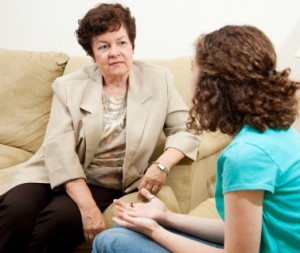 Recently I found myself on a website that had a lot of comments about how talk therapy was a waste of time and money.
Recently I found myself on a website that had a lot of comments about how talk therapy was a waste of time and money.
Well, consider this a response to all those people.
Now, for starters, it’s true that I am biased. I mean, I am a grad student learning to become a psychotherapist after all. Just keeping it honest.
I also lived with severe anxiety and depression for over 10 years, so it isn’t like I don’t know what it’s like to need or undergo therapy myself– been there, done that.
So, here’s the thing: Talk therapy works. And it works well.
I’ve heard a lot of folks say that they’ve gone to therapy and it was a bunch of baloney and to that I say: Could be.
See, not all therapists are good, competent, caring, well-trained, and so on. But neither are a bunch of other people who charge money for their services. Painting any profession with a broad brush, in general, just isn’t fair or smart.
I love how people say things like “She just asked me how I felt all the time… when I just wanted to fix the problem.”
That to me speaks volumes of the kind of misconceptions people have about therapy. Therapy can help you but it doesn’t do it alone. Generally speaking, the person being counseled has to do the heavy lifting. Surprise!
The job of the therapist is to guide you not just toward self-understanding, but also through the process of learning different ways of thinking about your problems and their solutions. Therapy isn’t about magical one time sessions. It is, however, about gaining insight, but it’s also much more than that.
In fact, talk therapy has been shown to be nearly as effective as drug therapy. I say nearly because for certain conditions, like schizophrenia for example, drugs are perhaps the only means of managing the condition.
But when you’re talking about anxiety, depression, obsession, phobias and the like, then therapy is effective. Studies have shown that psychotherapy even has the ability to alter the brain in the same way that drugs do (Friedman, 2002).
It’s thought that this happens because as a person goes through therapy, the things they learn produce new proteins that help to remodel neurons in the brain. Learning can literally re-wire your brain in this regard.
The things you learn can also be used over and over; they can be adapted, expanded, and combined with drug therapy to enhance the effects of both.
Let’s be clear though, does talk therapy help everyone? You bet it doesn’t, but neither does drug therapy or other modalities.
Gasp! What’s that… there are no guarantees? A big negative to that as well.
The bottom-line is that calling all therapists quacks is not only wrong-headed, it just might limit your options for bettering your situation. I’m also not sure why anyone would take something as potentially helpful as therapy off the table.
The fact is, psychology is studied and practiced at some of the most prestigious universities in the world, testimony from mental health professionals is permissible in a court of law, and to get more to the heart of the matter, thousands upon thousands have been helped by talk therapy in measurable ways.
How measurable? So measurable that the results can be seen on a brain scan; now how’s that for evidence?
Maybe people that take a negative view of therapy do so because they’ve fully prescribed to our microwave-culture: everything done in seconds and without thinking. The problem with that though is that when you have a thinking problem you have to learn to think your way out of it. And, at times, this requires assistance. In my humble opinion.
In the end, if drugs alone did it for you, – sweet! But don’t think for a second that what helped you will also help others. Plus, if you don’t want drugs and think talk therapy is dumb then I guess you’re out of luck! Really? No, of course not.
Be open, be smart, and ultimately do what works for you.
References:
Friedman, Richard. (2002). Like Drugs, Talk Therapy Can Change Brain Chemistry. Retrieved from: https://www.jsu.edu/criminaljustice/docs/mellen_drugs.pdf
Barth, F.D. (2010). Does Talk Therapy Really Work? Retrieved from: https://www.psychologytoday.com/blog/the-couch/201011/does-talk-therapy-really-work





I have anxiety. There were times when all I needed was someone to talk to, to get things off my chest. And my therapist provided me with that. I wasn’t comfortable telling my parents, or friends, just my therapist.
There were times when said to myself, “Why am I paying this guy a couple hundred dollars to sit there and listen?”
But it worked.
That’s a great point Brandon. I’ve heard people say why not just talk to your mom or brother? Well. Sometimes you don’t want to share that kind of stuff with loved ones.
And, on top of that, it could be helpful to find an objective listener that has some notion about what you’re going through versus someway just telling you over and over that you’re going to be OK.
talk therapy saved my life. i am doing great, essentially anxiety free now and no need to see my therapist professionally but there are times i’d love to have coffee with him just to chat! 🙂
i completely agree with what you say in the comment above. someone who has helped others through anxiety, who can tell you for certain that you are NOT crazy. that NO you do not have to be hospitalized, that this is anxiety, that’s all, and you can get through it. and just as the original anxiety guru claire weekes said, hearing it OVER and OVER from them as many times as you need to, especially in the beginning. i think talk therapy is essential to anxiety management.
i had coworkers that just did meds. i did meds as well to help, but it was with therapy. my coworkers said, ‘eh you don’t need therapy. the drugs will work’. ha! i want to kick anxiety’s ass. i didn’t want to passively rely on meds for the rest of my life.
happy to say they are old news and i’m still great. so there. 🙂
Great write-up, Paul!
Agree top to bottom. I’ve been to many therapists, some good… some not so good. One thing I will say is, if you’re going to go to therapy, you’d better be ready to do some shopping. Most therapists just want to fill their slots, so it’s up to YOU to know if it’s truly a good fit or not. If it’s not, move on… and look for someone that is. It’s very important not to stay in a therapy “relationship” just for the sake of being in one. Take it from someone who learned the hard way. 🙂
But, imo… if you have anxiety or depression, you should be in some kind of therapy, regardless of whether or not you’re using medication.
Cori, Nice job, by the way!! Love those success stories!
I’m med-free myself, now. Wouldn’t say I’m near being anxiety-free just yet, but I’m starting to see light at the end of the tunnel. So, it’s great to hear stories like yours. Congrats.
thanks Bryan3000! and great job you as well! i do still have anxiety but it’s NOTHING compared to before. here for a reason, easily managed and all ‘normal’ anxiety.
i completely agree that finding the RIGHT therapist for you is essential. i know just how immensely lucky i am that the first therapist i could get into was a great fit and just what i needed. and thank god for it, i was honestly ready to check myself into the hospital. whew!
One big problem with this article, is that I believe you are lumping two types of “therapy” together.
For conditions like Anxiety and Depression… “Talk Therapy” seems fairly useless. (And I am talking about the type of therapy where you discuss your issues, the person offers advice and then see you next week).
However, there is therapy that is highly effective for these conditions… more action oriented therapy (CBT, ACT, etc.), where there is some talk and a lot of at home practice and action, with the therapist pushing you along the way and helping you take steps. THESE are the types of therapy that are far more effective than medication.
Well, although CBT and the like do have a homework component to them it is still talk therapy. CBT, for example, focuses on talking about cognitive distortions and finding alternatives. This requires lots of talking.